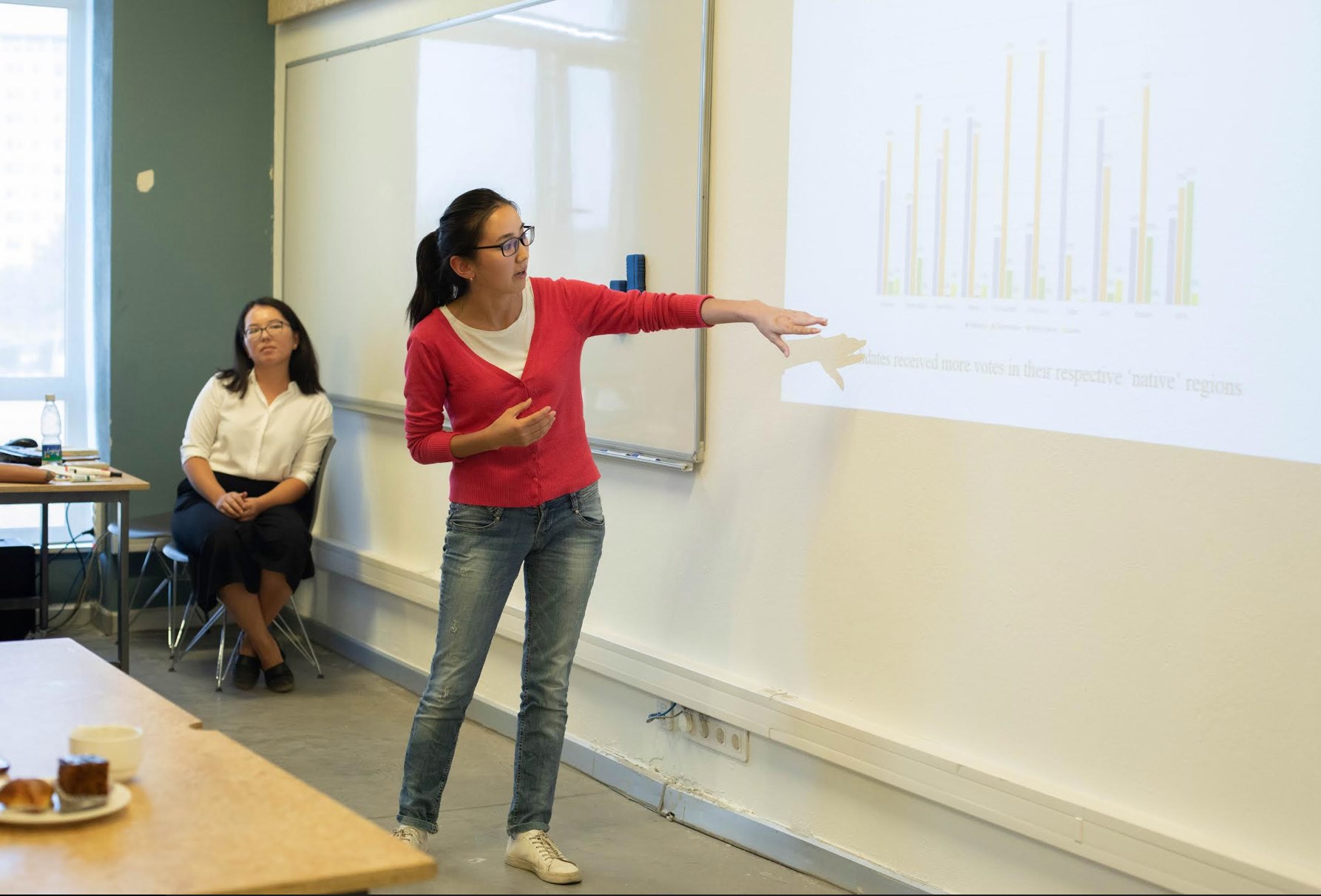September 11, 2019
�� �� �� �� ��
��
We are delighted to present you abstracts of the research projects and photo-report from Research Seminars organized between��August 15 - 28, 2019��within USAID Building the Future project.��
��
Introduction of nonlinear electricity tariffs and residential energy consumption. Case of Kyrgyzstan
��
Akylai Muktarbek kyzy
ABSTRACT
To ensure financial sustainability of energy sector, stable power supply, and to see some positive changes among population towards energy efficiency, a new nonlinear pricing policy was introduced for residential electricity consumers in Kyrgyzstan in December 2014. Using difference-in-difference models with fixed effects and data from Kyrgyz Integrated Household Survey, we evaluate the impact of new tariff structure on consumption of electricity and other energy sources during heating season. Households that were consuming above the threshold 700 kWh per month before the tariff change and faced 280% increase in marginal price for electricity, reduced their electricity use by approximately 31%. The treatment effect differs depending on income and geographic location of the household.��



��
Attitude of national Courts to Arbitration in Kyrgyzstan: myths, data, and analysis
��
Natalia Alenkina
Dinara Asanbaeva
ABSTRACT
The project examines various points of interaction and involvement of courts into arbitral process and attempts at drawing conclusions as to the attitude of state courts to arbitration and arbitration courts in Kyrgyzstan. The judiciary plays vital role in various aspects and stages of arbitration process. Starting from considering the validity of an arbitral clause and finishing with the enforcement of arbitral awards, state courts are inevitably involved into arbitral process. The research outcome of this paper is to create a map of paths of interaction between state courts and arbitration courts based on the analysis of legislation and judicial cases. Moreover, this paper aims to explore perceptions of judges on their role/place in commercial arbitration in Kyrgyzstan (bases for involvement, degree of interference, general attitude to the private methods of dispute resolution).



��
A Qualitative Analysis of the Micro-Credit Programs in Bishkek: Empowering Women or Reinforcing their Subordination?
��
Aikerim Nazaralieva
Ilker Corut
Gozde Yazeci Corut����
ABSTRACT
Through a qualitative research carried out mainly in the big bazaars of Bishkek, this research examines the posited tripartite relationship between free market, micro-finance and women empowerment by focusing on how small loans by the micro-finance institutions in Bishkek influence the lives of female loanees. It is shown that so long as the “individual autonomy” and the “capacity to make choice” are limited to the “individual autonomy” and the “capacity to make choice” of an individualist enterprising subject of neo-liberalism, they may not adequately serve as indicators of women empowerment/disempowerment in Bishkek. The research also underlines the disempowering effects of the neurological and affectional burden, that is, the constant sense of anxiety, that the loanees have to manage to survive in the unpredictable, unstable, threatening, neo-liberal business environment offering high-interest rate loans and exposing the loanees to over-indebtedness. These effects can be best followed, not only through the immediate physical manifestations of the constant sense of anxiety of the loanees, that is, the loanees’ very widespread complaints of high blood pressure and pains in arms and legs, but also and mainly through the fact that the very ways of seeing and identity/world-view of many of the respondents are largely determined by their desire towards stability, order, and “ontological security”.



��
Sustainable pasture management in the Suusamyr valley of the Kyrgyz Republic
��
Zheenbek Kulenbekov
Bozhil Kondev
ABSTRACT
Mountain pastures are vulnerable to a number of natural hazards such as erosion, landslides, climate change, and invasion of new species. The research project aims to study the encroachment of shrubs in the pastures of Suusamyr valley using methods such as interviews with local specialists and livestock owners and remote sensing to assess the pasture degradation issues and processes during the last 18 years. An attempt has been made to estimate the area covered by shrubs.



��
Social bases for young people’s political participation in Kyrgyzstan: evidence from Central Electoral Committee data, sampled survey, and Focus Group Discussions in Osh and Bishkek
��
Mehrigiul Ablezova
Shirin Tumenbaeva
Kanaiym Kydyralieva
Aigul Kanybekova��
ABSTRACT
Elections are at the core of any democratic system understanding the behavior of voters helps to reveal the patterns within the society. Such practice allows the citizens to control the authorities and decide on who should govern next. Last trends show the decline in turnout across countries and Kyrgyzstan is not an exception. In our study we focused on the voting behavior of residents of Bishkek and Osh.We have expanded the scope of the study from 2017 and have focused on various aspects of political participation in the current study, including the CEC data and the qualitative data from the FGDs among the youth, who has not participated in any of the elections. Our goal was to grasp the perception of the core political institutions in the country and the perception of democracy as well as the reasons for not voting. The findings reveal that age, gender and the level of political interest have an impact on the decision to vote. Older males with high political interest would have the highest probability to cast a ballot in the elections. Our study shows that youth in Bishkek and Osh cities share some of the features of political apathy and political alienation but it is not something which is only prominent to youth. There is a general scepticism towards politics among adults as well. Yet, in line with such moods youth is willing to engage in politics and impact the development of the country but such desires are restrained by the systematic problems as corruption, nepotism and injustice according to FGD participants.



